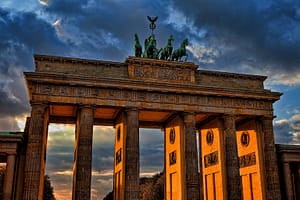Berlin, Germany’s capital, dates to the 13th century. It is situated about 112 miles (180 km) south of the Baltic Sea, 118 miles (190 km) north of the Czech-German border, 110 miles (177 km) east of the former inner-German border, and 55 miles (89 km) west of Poland. It lies in the wide glacial valley of the Spree River, which runs through the centre of the city. Reminders of the city’s turbulent 20th-century history include its Holocaust memorial and the Berlin Wall’s graffitied remains. The city lies at the heart of the North German Plain, athwart an east-west commercial and geographic axis that helped make it the capital of the kingdom of Prussia and then, from 1871, of a unified Germany. Berlin’s former glory ended in 1945, but the city survived the destruction of World War II. It was rebuilt and came to show amazing economic and cultural growth. Divided during the Cold War, its 18th-century Brandenburg Gate has become a symbol of reunification. The city’s also known for its art scene and modern landmarks like the gold-colored, swoop-roofed Berliner Philharmonie, built in 1963. This is a city that staged a revolution, was headquartered by Nazis, bombed to bits, divided in two and finally reunited – and that was just in the 20th century! Walk along remnants of the Berlin Wall, marvel at the splendour of a Prussian palace, visit Checkpoint Charlie or stand in the very room where the Holocaust was planned.
About
‘All free men, wherever they may live, are citizens of Berlin. And therefore, as a free man, I take pride in the words, ‘Ich bin ein Berliner!’ ‘ [I am a Berliner (citizen of Berlin)!] - John F. Kennedy

